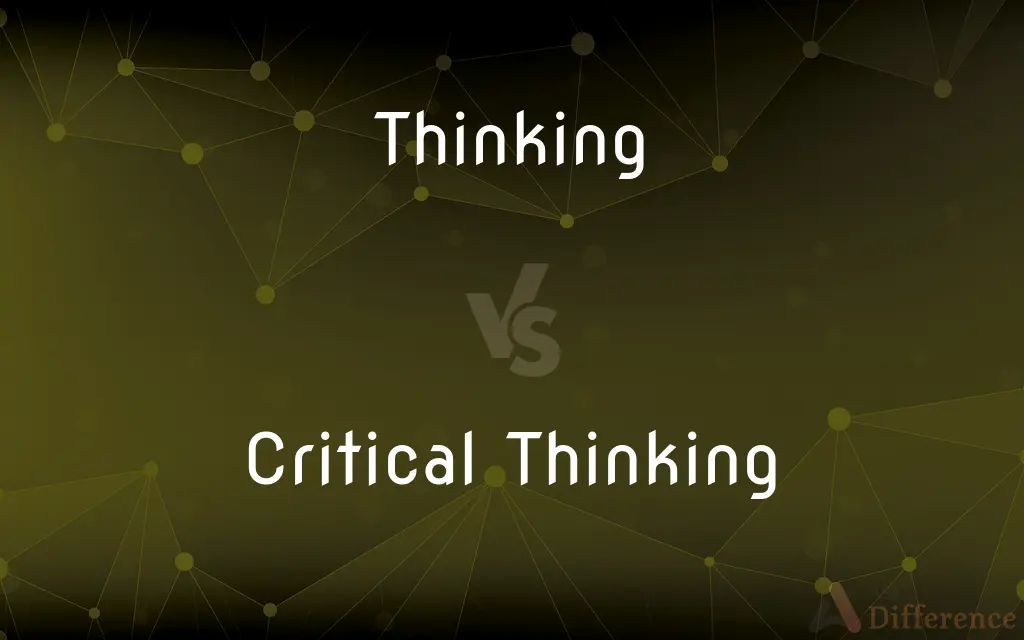Thinking vs. Critical Thinking — What's the Difference?
By Tayyaba Rehman & Fiza Rafique — Published on October 31, 2023
Thinking is a general cognitive process; critical thinking is its evaluative, analytical subset, requiring deeper examination and reasoning.

Difference Between Thinking and Critical Thinking
Table of Contents
ADVERTISEMENT
Key Differences
Thinking is a fundamental human activity, occurring when the mind processes information and forms ideas or concepts. It can be spontaneous, random, or directed, allowing us to understand, interpret, and make decisions about the world around us. Critical thinking, however, is a refined form of thinking. It demands a deeper level of analysis, evaluation, and synthesis of information to form a judgment.
Thinking can be passive. For instance, daydreaming or recalling a memory requires thinking but not necessarily any analytical process. Critical thinking, in contrast, is always active. It involves assessing the credibility of sources, identifying biases, and weighing evidence before drawing conclusions.
While thinking can often be based on personal beliefs, feelings, or incomplete information, critical thinking necessitates a rigorous approach to ensure objectivity and accuracy. It's a skill that needs to be cultivated and practiced, requiring one to be skeptical, open-minded, and methodical.
Moreover, thinking is inherent and is something we do every day without much effort. Critical thinking, on the other hand, often requires more energy and attention. It challenges one's own beliefs and assumptions, aiming for clarity, coherence, and logical consistency.
Comparison Chart
Nature
General cognitive process.
Evaluative and analytical form of thinking.
ADVERTISEMENT
Activity
Can be passive or active.
Always active.
Basis
Can be on personal beliefs or feelings.
Requires evidence and logical reasoning.
Skill Level
Inherent to all humans.
Requires practice and development.
Goal
Understanding and interpretation.
Objective judgment and decision-making.
Compare with Definitions
Thinking
The process of considering or reasoning about something.
She sat quietly, lost in her thinking.
Critical Thinking
Evaluating information to form a judgment.
Her critical thinking skills were evident in her essay.
Thinking
Intellectual activity or contemplation.
Some problems require deep thinking.
Critical Thinking
Systematic problem-solving using analytical skills.
Lawyers employ critical thinking in their arguments.
Thinking
The formation of thoughts and ideas in the mind.
His thinking was influenced by his experiences.
Critical Thinking
Thinking clearly and rationally about what to believe or do.
Critical thinking helps in making informed choices.
Thinking
Generating ideas, concepts, or associations.
Brainstorming sessions encourage free thinking.
Critical Thinking
The objective analysis and evaluation of an issue.
To solve this puzzle, you need critical thinking.
Thinking
The cognitive process of the brain.
Distractions can disrupt clear thinking.
Critical Thinking
Assessing the validity and reliability of claims or statements.
Scientists use critical thinking to test hypotheses.
Thinking
The act or practice of one that thinks; thought.
Thinking
A way of reasoning; judgment
To my thinking, this is not a good idea.
Thinking
Characterized by thought or thoughtfulness; rational
We are thinking animals.
Thinking
Thought; gerund of think.
What is your thinking on this subject?
Thinking
Present participle of think
I'm thinking about inventing a new perpetual-motion machine.
Thinking
Having the faculty of thought; cogitative; capable of a regular train of ideas; as, man is a thinking being.
Thinking
The act of thinking; mode of thinking; imagination; cogitation; judgment.
I heard a bird so sing,Whose music, to my thinking, pleased the king.
Thinking
The process of thinking (especially thinking carefully);
Thinking always made him frown
She paused for thought
Thinking
Endowed with the capacity to reason
Common Curiosities
Can biases affect critical thinking?
Yes, unchecked biases can hinder objective critical thinking.
Why is critical thinking important in education?
Critical thinking helps students evaluate information, make informed decisions, and develop reasoned arguments.
Is thinking the same as critical thinking?
No, thinking is a general process, while critical thinking is its evaluative and analytical subset.
Is daydreaming a form of thinking?
Yes, daydreaming involves thinking, but it doesn't necessarily involve critical thinking.
Is thinking always logical?
Not necessarily. Thinking can be influenced by emotions, beliefs, or biases.
How can I improve my critical thinking skills?
Practice questioning, analyze assumptions, seek diverse perspectives, and evaluate evidence objectively.
Can someone think without critically thinking?
Yes, thinking can be spontaneous or passive, without the analytical rigor of critical thinking.
Do all decisions require critical thinking?
Not all. Some decisions are routine or instinctual, but important or complex decisions benefit from critical thinking.
Why might two individuals, using critical thinking, arrive at different conclusions?
Differences in information, perspective, values, or interpretation can lead to different conclusions even with critical thinking.
Is thinking always conscious?
No, some thinking processes, like intuition, can be subconscious.
How is critical thinking related to creativity?
While they are distinct, critical thinking can evaluate and refine creative ideas, making them more effective and actionable.
Do we use thinking in everyday tasks?
Yes, thinking is inherent and used in everyday tasks, from simple to complex.
Is emotion incompatible with critical thinking?
No, but critical thinking requires one to recognize and evaluate emotional influences.
Is critical thinking only for complex problems?
No, critical thinking can be applied to any situation where objective analysis and decision-making are beneficial.
Can thinking be trained?
Yes, especially critical thinking, through education, practice, and exposure to diverse perspectives.
Share Your Discovery

Previous Comparison
Internal Check vs. Internal Audit
Next Comparison
Share Certificate vs. Share WarrantAuthor Spotlight
Written by
Tayyaba RehmanTayyaba Rehman is a distinguished writer, currently serving as a primary contributor to askdifference.com. As a researcher in semantics and etymology, Tayyaba's passion for the complexity of languages and their distinctions has found a perfect home on the platform. Tayyaba delves into the intricacies of language, distinguishing between commonly confused words and phrases, thereby providing clarity for readers worldwide.
Co-written by
Fiza RafiqueFiza Rafique is a skilled content writer at AskDifference.com, where she meticulously refines and enhances written pieces. Drawing from her vast editorial expertise, Fiza ensures clarity, accuracy, and precision in every article. Passionate about language, she continually seeks to elevate the quality of content for readers worldwide.
















































